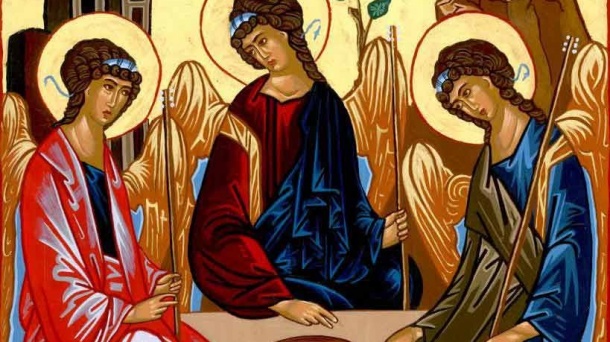A reflection on the Solemnity of the Most Holy Trinity, Year B
Deuteronomy 4:32-34, 39-40
Psalm 33 “Blessed the people the Lord has chosen as his heritage”
Romans 8:14-17
Matthew 28:16-20
“I am with you always, to the end of the age.” That has got to be one of my favourite passages of scripture. God is with us always, to the end of the age. That’s good news. If you won’t remember anything that I am going to write, at least remember that.
My name is Pedro, which is Peter in Spanish, and growing up, I was always very proud that my patron was the first Pope, St. Peter. But my middle name is Emmanuel – which means “God with us” – now that’s a special name. I was even more proud of my middle name. I love the idea that God is with us. Our God is not a God who is far away, sitting on a throne in heaven somewhere; our God is a God with us. And that is also good news! Today we celebrate a great feast: Today is the solemnity of the most Holy Trinity. Trinity is a fancy word that means “three” and it refers to the reality that our God is one God, three persons.
God is one God, three persons. It’s not three gods. He’s ONE God: “Hear, Oh Israel, the Lord is God, the Lord is one” (Deut 6:4), three persons. It’s not three aspects of God, or three qualities of God: Creator, redeemer, sanctifier. No, it’s three PERSONS: One God, three persons. It’s hard to understand. That’s why we call it a mystery. But it’s not a mystery like a murder mystery, an Agatha Christie or Scooby Doo mystery that we have to solve. No, when the Church talks about mystery, it means something that’s so amazing, so wonderful that it cannot be fully described in human terms. It cannot be fully understood. It can be partially understood, but never fully. And we use that word, ‘mysteries’ a lot. At Mass you’ll hear the priest speak of “these mysteries that we celebrate”. We also proclaim, “the mystery of faith”. We pray the “Mysteries of the Rosary” and in fact, the word in Greek for sacraments is “mysteries.” So we use that word a lot. And we have a few mysteries: The mystery of the Incarnation, the mystery of the Cross… and the mystery of the Trinity is probably the hardest one to understand: ONE God; THREE persons. But we don’t have to understand it. Still, I think that looking at the Trinity tells us something about the reality of God, about the nature of God, which in turn, because we are made in the image and likeness of God, tells us something about our nature as created human beings.
In the first reading, Moses uses several ways to describe God. There are no words to describe God fully, but throughout scripture people use different images to describe God. Moses describes him in terms of what God does: God is creator, God speaks out of a fire, God saves the nation of Israel. By showing what God has done, Moses shows how awesome God is. But God is not just a God who does. God is a being. God is not a ‘doing’. God is a being and because we are created in the image of God, it means that we are beings as well. We are not human ‘doings’, we are human beings. We are not defined by what we do or by what we are capable of doing; we get our dignity by who we are: Created beings, in the image and likeness of God. But God is also not just a force of nature, or THE FORCE, like in Star Wars. God is not a life force or energy, God is not a concept (despite what John Lennon says); God is a person. You can have a personal relationship with God. God is a person and we too are persons. We are persons from the moment of conception to the moment of natural death. No matter what you have done, no matter whether you are in a coma, or whether you suffer from an intellectual disability, whether you are conscious or not, you are a person. But God is not just A person; God is THREE persons.
Read more...
